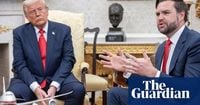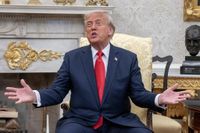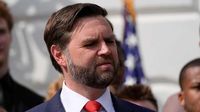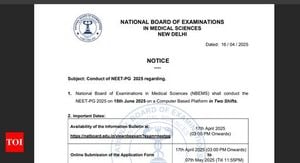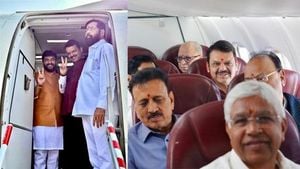U.S. Vice President J.D. Vance expressed optimism regarding a potential trade deal with the United Kingdom, emphasizing the importance of the relationship between the two nations. Speaking in an interview with UnHerd on April 15, 2025, Vance stated, "We’re certainly working very hard with Keir Starmer’s government." He underscored the cultural ties that bind the U.S. and the U.K., noting, "The president really loves the United Kingdom. He loved the Queen. He admires and loves the King. It is a very important relationship. And he’s a businessman and has a number of important business relationships in [Britain]. But I think it’s much deeper than that. There’s a real cultural affinity. And, of course, fundamentally, America is an Anglo country. I think there’s a good chance that, yes, we’ll come to a great agreement that’s in the best interest of both countries."
This statement comes in the wake of President Donald Trump’s recent imposition of sweeping tariffs on imports to the U.S., which has stirred concerns about global economic stability. In March 2025, Trump announced a 10% tariff on imports from the U.K., contributing to fears of a potential recession as stock prices began to tumble. However, in a surprising shift, the Trump administration has since rolled back many of these tariffs, reducing the rate for most countries to 10% and exempting electronics such as smartphones and laptops from the levies, including the previously imposed 145% charge on imports from China.
Despite the current 10% tariff on British imports, U.K. officials are hopeful that a trade deal could mitigate these charges. Vance pointed out that the "reciprocal relationship" between the U.S. and U.K. gives Britain an advantageous position compared to other European nations. He remarked, "While we love the Germans, they are heavily dependent on exporting to the United States but are pretty tough on a lot of American businesses that would like to export into Germany." This sentiment was echoed by U.K. Business and Trade Minister Sarah Jones, who welcomed Vance’s comments, stating, "There is a deal there to be done."
Chancellor Rachel Reeves is set to continue negotiations for an economic deal with the U.S. later this month as she travels to Washington for the International Monetary Fund’s spring meetings with other finance ministers. The U.K. government is eager to finalize a deal that would exempt it from Trump’s tariffs, which have affected various sectors including steel and automobiles.
In the broader context of international trade, Trump has been vocal about his administration's stance on tariffs. He recently indicated a desire to impose additional tariffs on pharmaceuticals, stating, "Yeah, we’re going to be doing that," and adding that the intention is to "make our own drugs." This move aligns with his administration's goal to reshore critical manufacturing sectors, including pharmaceuticals and semiconductors, which the U.S. currently relies on imports for, particularly from Taiwan and South Korea.
As trade discussions continue, the U.S. is also navigating complex relationships with other nations. For instance, Trump has criticized Chinese President Xi Jinping's recent tour of Southeast Asian countries, suggesting it was aimed at undermining U.S. interests. Trump remarked on Xi's visit to Vietnam, saying, "That’s a lovely meeting. Meeting like, trying to figure out, ‘how do we screw the United States of America?’" This comment highlights the ongoing tensions between the U.S. and China amid a broader trade war.
Meanwhile, South Korea is reportedly working to delay reciprocal tariffs as much as possible. Finance Minister Choi Sang-mok mentioned that discussions are ongoing regarding a 25% tariff that has been postponed by 90 days under the Trump administration. The South Korean government aims to finalize these negotiations before a presidential election scheduled for June 3, 2025, following the ousting of President Yoon Suk Yeol.
In addition to these international negotiations, the Trump administration has taken a firm stance against certain U.S. universities, freezing over $2.2 billion in grants for Harvard University after it refused to comply with the administration's demands regarding diversity and admissions reforms. This move is part of a broader strategy targeting multiple institutions, including Brown, Princeton, and Cornell.
As the U.S. navigates these complex trade relationships, the focus remains on fostering agreements that can benefit both American and British economies. Vance’s comments reflect a concerted effort to strengthen ties with the U.K. amidst the backdrop of fluctuating tariffs and shifting international dynamics. With ongoing negotiations and a shared cultural affinity, both nations appear poised to explore opportunities for a mutually beneficial trade agreement.
